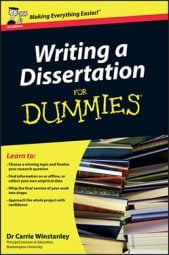Nothing seems worse than having that cursor flashing at you in the top left-hand corner of a blank screen – it almost seems as if the cursor’s mocking you! Anyone who’s ever written anything substantial (like an essay for example) knows only too well the difficulty of getting that first paragraph down on the page and then being completely stuck.
Writer’s block is more serious that just having an off-day. When the lack of motivation or inability to get going with your writing lasts for an extended period, you know that it’s time to find a solution, fast.
Procrastination is a common problem amongst writers, and students don’t escape either. Academics especially experience writer’s block and your tutor or supervisor is likely to appreciate and understand your frustration. Whichever way writer’s block manifests itself, you’re likely to feel guilty, hopeless and maybe also angry with yourself for being so idle and useless. Don’t give in to these feelings as they’re only going to make things worse.
Sometimes you tell yourself you’ve got writer’s block when in reality you’ve quite a different problem. For example, not being able to get down to writing your dissertation may be caused by poor time-management skills and you just need to rethink your plans. Failing to face up to emotional worries causes other (related) problems. Once you’ve recognised why you’re indulging in work avoidance behaviours, you’re well set up to righting the situation.
Here are some suggestions for dealing with writer’s block:
Read something – anything. First try reading a text linked to your study and see if it gives you a flash of inspiration. If that’s no good, try reading something totally different but well written. It can be the excellence of the writing that lights a spark inside you.
Look at your dissertation or chapter as a whole. Rather than focusing on the bit that’s left you stuck, you can benefit from looking at the bigger picture.
Get up and go somewhere else. Take a momentary breather. Go and wash your face, or brush your teeth or make a cuppa, or put away the dried dishes or tidy up your shoes from the hallway. Doing something minor or trivial for a short time can help to you get moving again on the real task in hand.
Have a complete break – go to bed early and set your alarm for an early start. Just switch off and try thinking about anything except your dissertation for a few hours (obviously this isn’t going to work if you’ve only a few days until submission, but can be reviving if you still have a bit more time in the bank).
Just write any old thing that comes into your head – but get writing. If you’re working on your dissertation, try using a different colour or font so that what you’re writing stands out.
If you simply can’t bear to look at your dissertation, try writing something else altogether such as a thank you card or answer some emails – things you’ve been putting off. After a while, go back to writing your dissertation – you may find that it’s the actual writing that’s a pain rather than trying to work up your ideas.
Some people actually find their creative juices flowing when they’re feeling worn out rather than when they’re feeling fresh. I’m not going to recommend this as a general tactic for getting down to your writing (partly due to the number of typos that creep into your dissertation and the nonsense you’re going to have to correct later). However, working under pressure can sometimes be stimulating, releasing you from the distress of writer’s block.
Go chat with someone. Someone in your support group is your best choice, but failing that, anyone who’s willing to listen!
Have a change of scenery. Pack up your work and go somewhere else, a café, the library, a shopping mall with nice seating, a park (if it’s fine weather) a museum café – anywhere but where you are now.
Do some more research on the area of your dissertation where you’re stuck. Even if you don’t find anything new, it can be reassuring to discover that you actually do know quite a lot. If facing what’s difficult in your dissertation is scary, you may need to go right back to the drawing board and start afresh on the part that’s troubling you, before getting back on track with your writing.
Although it sounds weird, some people swear by it – pouring out on paper the anguish you’re feeling because of writer’s block can be your cure! Telling the world what’s making you angry and annoyed can be cathartic. And having got all that out of your system you’re ready to start anew.

